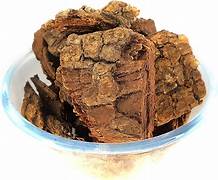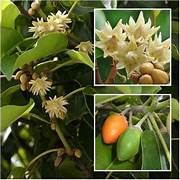Bakul tree benefits, uses and home remedies

Bakul, is also known as Owad, is an important herb mentioned in Ayurvedic medicine. Belonging to the Ranunculacae family, it is found all over India . Bakul tree has many benefits like it is good for heart, gives strength removes worms and is beneficial in problems associated with teeth and gums.
The herb’s roots are the primary part used in medicinal formulations, containing a wealth of bioactive compounds such as saponins, flavonoids, and alkaloids
Latin Name: Mimisops elengi
English Name : Spanish cherry, Medlar, Bullet wood
Vernacular Names:
- Hindi: Moulasiri
- Bengali: Bakul
- Tamil: Bagulam
- Telugu: Podataa chhetu
- Kannada: Bahula hoovugalu
- Malayalam: Elaingi
- Marathi: Bakud
- Gujarati: Bolasari
Sanskrit Name:
Chira puspha : The flower remain fresh for long time.
Madhugandha : The flower has a pleasant smell.
Streemukha, Sthirakusuma, Sthirapushpa : The fragrance of flower is retained even after it is dried.
Seedugandha, Madhugandha : The smell of flower is intoxicating like alcohol.
Shiva : Auspicious. The seeds of bakul is offered to lord Shiva
Drakshaphala : Fruits resembles grapes.
Bakul Benefits & Ayurvedic Description
Bakul holds an important place in Ayurveda . The bakul tree is found all over India and in forest of South Asia, south east Asia and northern part of Australia. The spanish cherry tree in a long tree, the leaves are similar to a mango leaf. The flower are small, white in color and circular in shape and sweet fragrance. The fruits of this tree are almond shaped, the ripen fruits becomes like copper color. The fragrance of bakul flowers are beneficial in purify the environment. The flowers are also used to make perfumes.
Ras ( Taste)
- Katu ( Pungent)
- Kashay (Astringent)
Veerya ( Potency)
- Sheet (Cold)
Vipaak ( Post-digestive effect)
- Katu (Pungent)
Guna ( Qualities)
- Guru ( Heavy)

What is the fuctions of Bakul
It Improves Oral Health
One of the best health benefits of the Bakul flower is its innate ability to significantly improve oral health. The extracts obtained from the bark of this tree are extremely helpful in the treatment of oral ulcers and bleeding gums .The decoction of bark is prepared and used as mouth wash .It’s twigs are used for teeth cleaning.
Moreover, it helps prevent tooth decay, toothache and bad breath.
Gives strength to body and heart
Bakul flower uses are immense. The dried, powdered flowers of the Bakul Pushpa help in improving heart health, with benefits for the entire cardiovascular system. It is consumed as a general tonic to enhance body strength.
Helps treat animal bites
The useful components of the Bakul plant have an excellent anti-poison effect, making it one of the best herbs to treat animal bites. The juice that is extracted from the leaves is highly efficacious in the treatment of insect, scorpion and snake bites.
Helps in bleeding disorders
Bakul tree and its flower are very beneficial in controlling heavy bleeding during menstrual cycle. The sheet(cold) potency and astringent taste of this herb helps in controlling the excess bleeding. It is also useful in dysmenorrhea and leucorrhea
Improves urine output
Bakul tree’s bark is the best diuretic. In ayurveda, the bark extracts are given to patients with bladder inflammation, urinary retention and to promote urination.
Used to Improve Fertlity
The fruit pulp is known to improve fertility in women. For centuries expecting mothers have been treated with Bakul as it has chemicals that are great for women. In fact, expecting mothers are given measured doses to promote delivery. This is one of the finest bakul tree benefits.
Medicinal Qualities of Bakul
Madhur: It is having sweet taste
Vishada: Clarity and non slimy.
Hima : Coolant
Kapha-Pitta har: Balances Kapha- Pitta dosha
Hrudya : Works as cardiac tonic .
Dantya : Good for teeth and gums.
Sangrahi : Absorbent useful in diarhhea and IBS.
Vatala : it increases vata dosha.
Chemical composition of Bakul
The primary chemical constituents of Bakula Pushpa include tannins, sterols, taraxerol, spinasterol, beta-sitosterol, D-mannitol and mimusopsic acids.
The primary components of the Bakula Pushpa are known to have excellent antiviral, antimicrobial, anti-inflammatory, anti-ulcer, anthelmintic, antioxidant, anti-hyperglycaemic, diuretic, analgesic, and wound-healing properties.
How to use Bakul
Bakul can be consumed in various forms, including:
- Bakul Powder (Churna): 2 to 3 gms of bakul powder with warm water or honey, two times a day.
- Decoction: Prepared by boiling the Bakul in water, useful as mouth wash and to improve oral health.
- Part Used : Bark, Flowers, Fruit.
Home Remedies of Bakul tree
In Problems of Gum & teeth : Take Bakul bark, Dry Amla fruit, and Khadir bark in equal quantity and add 1 liter of water. Boil the water till 1/4 the amount is left. Let this decoction cool down. Garling with this decoction 3 to 4 times daily help relieve all type of gums problems like swollen gums, bleeding gums and makes teeth stronger.
In cough and cold : Bring fresh flowers of bakul 10 grams and soak it 1 cup of water. Keep it overnight. Next day morning filter the water. Drink this water in morning. Do this for 7 days.
To Improve heart health: Make decoction from Bakul bark and Arjun bark. Drinking this decoction helps to improve heart health.
Cautions And Contraindications
While Bakul(Mimisops elengi ) has many benefits and is generally safe, excessive consumption may cause:
- Dryness of mouth, tremors and other Vata dominance symptoms .
- Allergic reactions in rare cases.
Pregnant or lactating women and those on medications should consult a healthcare professional before use.
Frequently asked question
1.Can this herb be used while taking homoepathic medicine ?
Yes. This herb does not react with homeopathic medicine.
2.Can this herb/medicine be continued while taking supplements like multivitamin, omega 3, spirulina.
Yes .Generally this herb goes well with most dietary supplement. However if you are taking more than one product per day please consult your doctor for opinion.
3. With western/modern medicine
Seek your doctors advice if you are taking this product along with other western (allopathic/modern) medicine. Some ayurvedic herbs can interact with modern medicine.
When taking ayurvedic medicine or herb with modern medicine it is best to keep one hour gap in between both the medicine.
4. How long does Bakul take to start showing result ?
It depend on any existing disease, overall health, your prakriti ( genetic make up) all these factors plays a role in how quickly bakul work. However it is observed that results are usually visible in 1-2 weeks or even months.
5.Can it be used in people with diabetes?
Yes. But always keep watch on your sugar levels. This herb can lower your blood sugar levels. Do not stop your diabetes medicine once you start taking this herb/medicine. Keep in touch with your ayurvedic doctor. They will guide you in this respect.
6.Are there any diet restriction( Pathya) while taking this product.
No .There are no such restriction while taking this product. However if you have been advised with any specific diet based on disease, you should continue to follow it.
Ayurvedic medicine that contains Bakul
Bakul ( Mimisops elengi) is main ingredient in following medicines
Khadiradi Guti: It is herbal combination of herbs mainly containing Bakul and is useful in problems related to sore throat, cough and skin infection.
Dashang lep: It is a mixture of herbs which contains bakul and other pittashamak herb. Dashang lep is used to reduce inflammation, swelling and pain. It is applied externally.
Eladi Tailam : This is a ayurvedic medicated oil used for healing wounds.
Conclusion
Bakul is a one of Ayurvedic herb, revered for its healing properties . Whether for improving oral health ,keeping the heart healthy, or overall strength, Bakul continues to be a trusted herb for promoting health and well-being in a natural and holistic way.
Please consult your doctor before taking this medicine.
This Article is written by Dr. Ashutosh Tiwari B.A.M.S, PGDCR Director of Risha’s Health And Ayurvedaa Solutions.He is having more than 20 years of experience in field of Ayurvedic medicine.
.
